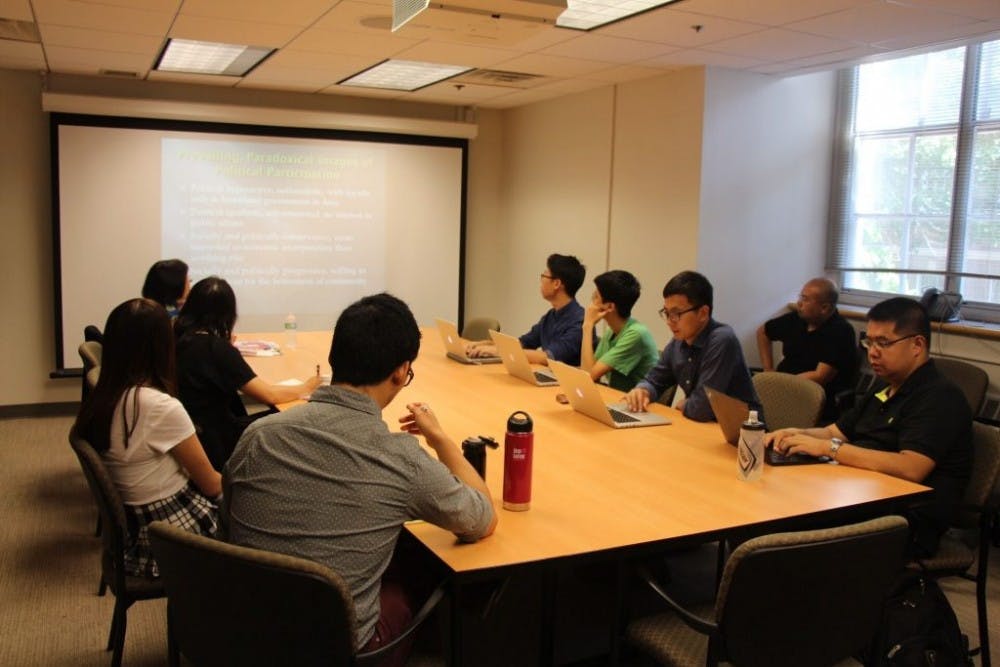The East Asian Studies (EAS) program hosted a seminar titled “Demystifying the Political Participation of Asian Americans” on Tuesday afternoon as its first installment of the EAS Fall Speaker Series. Guest lecturer Pei-te Lien, a professor in political science, Asian American studies and feminist studies from the University of California, Santa Barbara, discussed the effects of U.S. racial and ethnic politics on the political perception of Asian Americans.
Lien prefaced her talk by explaining that her research on the political participation of Asian Americans attempts to study a stereotyped minority, particularly when contrasted with their growing presence within the actual American population.
“I try very hard to try to understand a population that actually seems to suffer from a lot of stereotyping and misunderstanding in terms of their political behavior,” Lien said. “The purpose of this talk is trying to unpack the ideas and oversimplifications that dominate many people’s consciousness today.”
Lien then began the seminar by defining the boundaries of her research and highlighting key terms.
“When we talk about Asian Americans it’s by geographic origin, people of Asian decent who reside in the United States on a long-term basis,” she said. “We are also talking about American citizens and to-be citizens. Many people are actually in the process of becoming American.”
Lien then expanded that within the umbrella term of “Asian American,” individuals tended to self-select depending on geographical origin, with the main countries and places of origin for Asian Americans being China, Taiwan, Japan, Korea, Vietnam and the Philippines. She also listed India, Iran, Iraq, Israel and Syria as countries of origin for Asian Americans in order to be as inclusive as possible.
Lien then defined political participation. She explained that there are four categories: electoral and non-electoral as well as domestic and non-domestic. According to Professor Lien, Asian-American political participation in the United States is primarily domestic and electoral, consisting mainly of voting, campaigning, volunteering and running for office.
Non-domestic electoral participation takes the form of holding office in the homeland government, lobbying and campaigning for U.S. foreign policy. Non-domestic and non-electoral includes liberalization and fundraising. Domestic non-electoral consists of lobbying and implementing boycotts and strikes.
Lien then explained that many people held beliefs that Asian Americans harbor some sort of loyalty to their homeland governments in Asia. She added that some people believe that Asian Americans are motivated by self-interest and are not interested in incorporation. Some believe Asian Americans are socially and politically progressive and willing to work for the betterment of society.
To provide a complete overview of the history of these conceptions, Lien discussed the four stages of political participation.
From the mid 1800s to the early 1960s, Asian Americans began to participate in early non-political forms in response to racial exclusion. As early as 1790, the United States colonial government restricted citizenship to free white people.
According to Lien, throughout the 19th century, East Asian immigrants experienced various forms of racism.
The most famous example of this is the 1882 Chinese Exclusion Act, which is the only restrictive immigration law tied to an ethnic name. Despite the various forms of racism that immigrants experienced, there was slow progress. For instance, in United States v. Wong Kim Ark, the Supreme Court affirmed birthright citizenship for all U.S.-born people, regardless of the citizenship of their parents.
Lien said that in the mid-1960s to 1970s, there was a movement towards rising racial consciousness that coincided with the anti-war protests of the late sixties. From the 1970s to the present, constituents have elected Asian Americans to office in Hawaii and large metropolitan areas in the lower 48 states, such as San Francisco.
Lien added that suburbs were and continue to be new, emerging sites of politics due to the influence of immigrants.
Throughout the lecture, Lien highlighted that Asian Americans currently make up only six percent of the total population of the United States.
Lien pointed out that while 68 percent of Asian Americans are citizens, only 39 percent of those citizens are registered to vote. According to a Current Population Survey conducted in 2012, of that 39 percent over 80 percent turned out to vote in Nov. 2012.
“The proper question to ask then is how many Asian Americans are actually eligible to vote?” Lien said. “And then, in spite of being a numerically small group, the population of Asian American voters is the fastest growing.”
She explained that there are more registered Democrats than Republicans in the Asian-American community, but most eligible voters belong to neither party. She added that even more important than party affiliation is the fact that Asian American voters are becoming a solid Democratic bloc.
She then discussed the number of Asian Americans in office. According to Lien, unlike their Latino and Black counterparts, Asian municipal officials were mostly elected from non-majority Asian cities.
While highlighting the progress made, Lien discussed the latest efforts from within the Asian American community to educate lawmakers and the public about the past racism and xenophobic actions of the American leadership.
She touched upon the 1882 Project, which helped secure the passage of two congressional resolutions expressing regret over the 1882 Chinese Exclusion Act.
“The Asian-American community is entering into a new wave of political activism,” Lien said.
Daniel Kim, head of the East Asian Studies Student Advisory Committee, wrote that Lien debunks the common myths about Asian American political involvement
“Asian Americans are often viewed as politically languid, self-interested or indifferent when it comes to voting,” Kim wrote in an email to The News-Letter. “Professor Lien, however, debunks these myths. It is true that as part of the whole AAPI demographic in the U.S., only a small portion votes — however, out of those who are eligible and registered to vote, a vast majority votes. The Asian American community is not politically passive. Rather, the question should surround the eligibility requirements for minorities and immigrants, which ultimately dictate who gets to vote and who doesn’t.”





